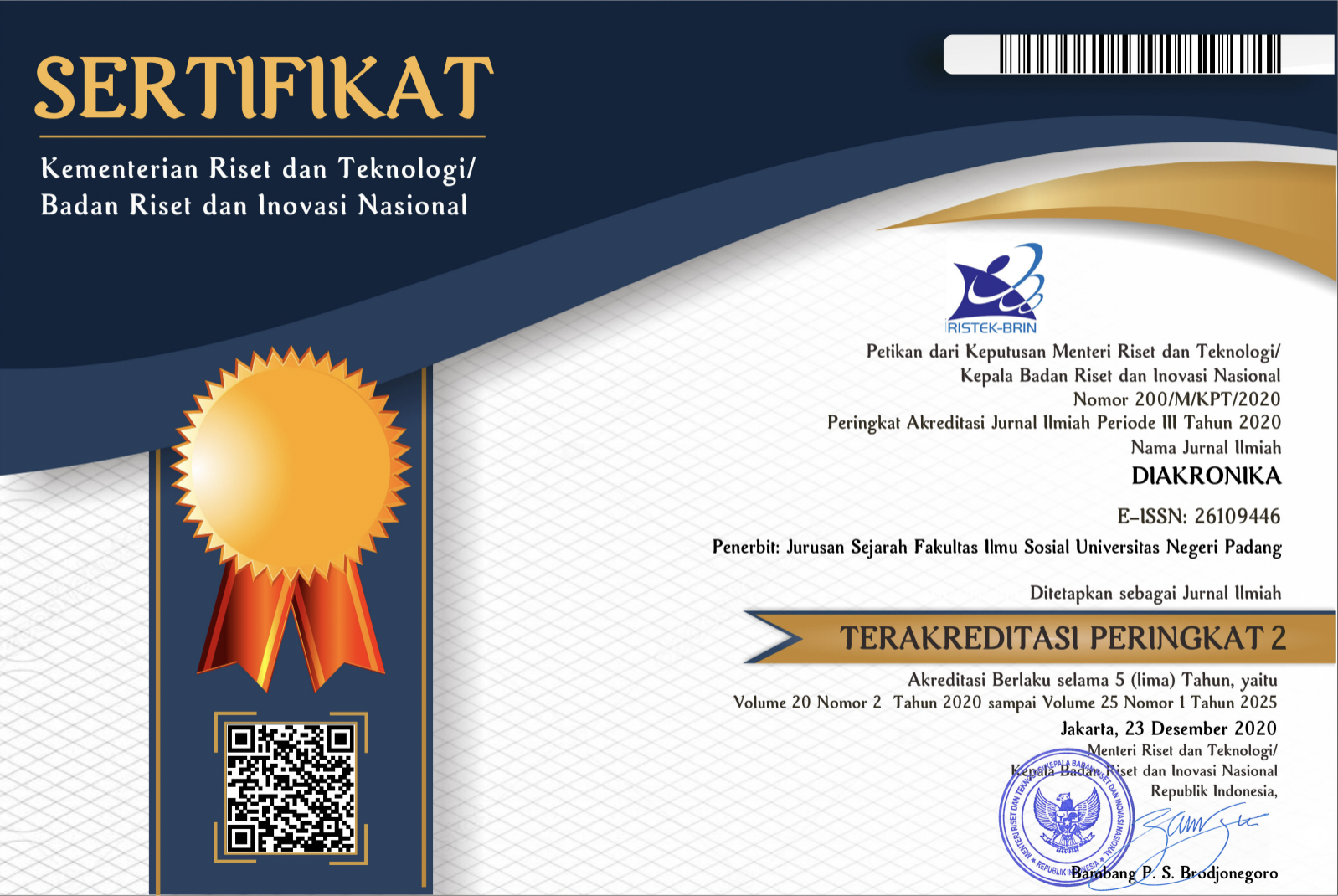Pengembangan Kawasan Wisata Mandeh melalui rekonstruksi kearifan lokal perempuan pesisir, Kabupaten Pesisir Selatan, Sumatera Barat
Abstract
The Mandeh Tourism Area has been considered as Raja Ampat of the western Sumatra. However, this tourist area is very genuine and has not functioned as well as possible. In the National Tourism Development Master Plan (RIPPNAS) in 1998, the Mandeh tourism area recorded as a center for marine tourism development for the western region of Indonesia, along with Biak and Bunaken in the eastern part. Towards this preparation, exploring all aspects of local potential in preserving marine tourism is necessary. One of the aspects is through women's groups. Women's understanding is fundamental in environmental examination to create an environmentally friendly and women-friendly life. Therefore, investigating its potential as a reconstruction reference is necessary. This paper aims to describe the local potential of women in the Mandeh tourist area through the rebuilding of environmentally friendly local wisdom. This article employed an approach that focuses on the historical method, especially the oral history method. Data was collected through in-depth interviews and participant observation. The primary informants of this study were women in the Mandeh Integrated Tourism Area using the snowball technique. Data analysis was collected by using a historical analysis model. The local wisdom of Mandeh women can be categorized into several groups; (1) in preserving the environment and maintaining marine ecosystems through the prevention of their husbands who work as fishermen in brutal fishing; (2) utilization of the natural surroundings for healthy food and medicine; (3) culinary processing based on local potential.
Downloads
References
Alhadi, Z. (2018). Community-based tourism development viewed from economic, social culture and environment aspects in mandeh’s integrated marine tourism area. MATEC Web of Conferences,
Aminah, F. V. Y. (2011). Makna wanita tentang perubahan peran (Hasil kajian disertasi wanita isteri nelayan Suku Kaili dalam perubahan peran dari domestik tradisonal ke publik produktif). Media Litbang Sulteng, 4(1).
Asnan, G. (2002). Transportation on the west coast of Sumatra in the nineteenth century. Bijdragen tot de taal-, land-en volkenkunde, 158(4), 727-41.
Bahardur, I. (2018). Kearifan Lokal Budaya Minangkabau dalam Seni Pertunjukan Tradisional Randai. Jentera: Jurnal Kajian Sastra, 7(2), 145-60.
Budiman, A. (1982). Pembagian kerja secara seksual: Sebuah pembahasan sosiologis tentang peran wanita di dalam masyarakat. Penerbit PT Gramedia.
Chadwick, R. (1991). Matrilineal inheritance and migration in a Minangkabau community. Indonesia(51), 47-81.
Climo, J. J., & Cattell, M. G. (2002). Social memory and history: Anthropological perspectives. Rowman Altamira.
Cowan, N. (2008). What are the differences between long-term, short-term, and working memory? Progress in brain research, 169, 323-38.
Demartoto, A. (2012). Pemberdayaan Perempuan dalam Pariwisata Berbasis Komunitas [Disertasi, Universitas Gajah Mada]. Yogyakarta.
Dobbin, C. E. (2008). Gejolak ekonomi, kebangkitan Islam dan gerakan padri: Minangkabau 1784-1847. Komunitas Bambu.
Fahimah, S. (2017). Ekofeminisme: Teori dan Gerakan. Jurnal Komunikasi Dan Penyiaran Islam, 1, 14.
Fatimah, S. (2012). Gender dalam komunitas masyarakat Minangkabau; Teori, praktek dan ruang lingkup kajian. Kafaah: Journal of Gender Studies, 2(1), 11-24.
Fatimah, S. (2015). Report" Planning for Mandeh Tourism Planning (Mandeh Masterplan). Pesisir Selatan: Agency For Regional Development District Pesisir Selatan.
Fatimah, S., & Ramadhan, D. (2019). Sustainable tourism integrated tourism area based on culture and local wisdom at Mandeh Area. International Journal of Tourism, Heritage and Recreation Sport, 1(1), 1-7.
Fatimah, S., Syafrini, D., & Zainul, R. (2021). Rendang lokan: history, symbol of cultural identity, and food adaptation of Minangkabau tribe in West Sumatra, Indonesia. Journal of Ethnic Foods, 8(1), 1-10.
Halbwachs, M. (1992). On collective memory. University of Chicago press.
Herlina, N. (2020). Metode Sejarah. Satya Historika.
Hermon, D., Gusman, M., Putra, A., & Dewata, I. (2022). Value estimating of the sedimentation rate at the shipwreck sites (MV Boelongan Nederland) the Mandeh Bay Region-Pesisir Selatan Regency. IOP Conference Series: Earth and Environmental Science,
Irawan, N., & Nara, V. (2020). Managing women empowerment through participation in sustainable tourism development in Kampong Phluk, Siem Reap, Cambodia. International Journal of Economics, Business and Accounting Research (IJEBAR), 4(02).
Karjuni Dt Karjuni, Firnaldi, A., & Fajri, H. (2018). Fisherman empowerment and poverty in Pesisir Selatan regency. MATEC Web of Conferences,
Kementerian PUPR. (2015). Presiden Canangkan Kawasan Wisata Bahari Mandeh Sumbar. https://pu.go.id/. Retrieved 08/29 from https://pu.go.id/berita/presiden-canangkan-kawasan-wisata-bahari-mandeh-sumbar
Lasso, A., & Dahles, H. (2020). Fishermen into tour boat operators: Tourism development in Labuan Bajo, Indonesia. In Tourism and development in Southeast Asia (pp. 133-46). Routledge.
López-Guzmán, T., Sánchez-Cañizares, S., & Pavón, V. (2011). Community-based tourism in developing countries: A case study. Tourismos, 6(1), 69-84.
MacKay, N. (2016). Curating oral histories: From interview to archive. Routledge.
Meitasari, S., & Furkan, L. M. (2021). The Role of Woman Entrepreneurship in Creative Tourism Development. 18th International Symposium on Management (INSYMA 2021),
Muhammad, K. H. (2021). Islam Agama Ramah Perempuan. IRCiSoD.
Nassani, A. A., Aldakhil, A. M., Abro, M. M. Q., Islam, T., & Zaman, K. (2019). The impact of tourism and finance on women empowerment. Journal of Policy Modeling, 41(2), 234-54.
Okazaki, E. (2008). A community-based tourism model: Its conception and use. Journal of sustainable tourism, 16(5), 511-29.
Olick, J. K. (2013). The politics of regret: On collective memory and historical responsibility. Routledge.
Porter, B. A., & Orams, M. B. (2014). Exploring tourism as a potential development strategy for an artisanal fishing community in the Philippines: The case of Barangay Victory in Bolinao. Tourism in Marine Environments, 10(1-2), 49-70.
Purnomo, A. (2006). Teori peran laki-laki dan perempuan. EGALITA.
Putra, I. N. D. (2014). Empat Srikandi Kuliner Bali: Peran Perempuan dalam Pembangunan Pariwisata Berkelanjutan. Jurnal Master Pariwisata (JUMPA).
Putra, R. E. (2020). Traditional Fishermen in the Development of the Coastal Tourism Area in Sumatera Barat. KOMUNITAS: International Journal of Indonesian Society and Culture, 12(1), 86-97.
Raynaldo, A., Mukhtar, E., & Novarino, W. (2020). Mapping and change analysis of mangrove forest by using Landsat imagery in Mandeh Bay, West Sumatra, Indonesia. Aquaculture, Aquarium, Conservation & Legislation, 13(4), 2144-51.
Rujikartawi, E. (2020). Mistik Wujud Kearifan Lokal. Tsaqofah, 10(2), 115-31.
Schreiner, M., Sherraden, M., Clancy, M., Johnson, L., Curley, J., Zhan, M., Beverly, S., & Grinstein-Weiss, M. (2005). Assets and the poor: Evidence from individual development accounts. Inclusion in the American dream: Assets, poverty, and public policy, 185-215.
Shiva, V., & Mies, M. (2005). Ecofeminis: Perspektif Gerakan Perempuan dan Lingkungan (Diterjemahkan oleh Kelik Ismunanto & Lilik). Cetakan I. Yogyakarta: IRE Press.
Sri, A. A. P. (2013). Faktor-faktor yang memotivasi perempuan sebagai pengelola pondok wisata di Kelurahan Ubud Kecamatan Ubud Kabupaten Gianyar. Analisis Pariwisata, 13(1), 1-10.
Tamm, M. (2013). Beyond history and memory: New perspectives in memory studies. History Compass, 11(6), 458-73.
Then, J., Felisa, H., & Irene, N. (2021). Sustainable Tourism Development in the Mandeh Tourism Area, Padang, West Sumatra. International Conference on Sustainable Development Goals (ISCIS),
Thompson, P. (2002). The voice of the past: Oral history. In The oral history reader (pp. 35-42). Routledge.
Tucker, H., & Boonabaana, B. (2012). A critical analysis of tourism, gender and poverty reduction. Journal of sustainable tourism, 20(3), 437-55.
Zed, M. (2012). Teori dan Metodologi Sejarah. UNP Press.




